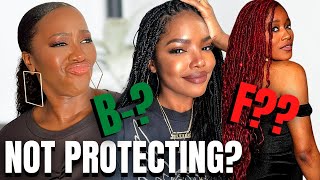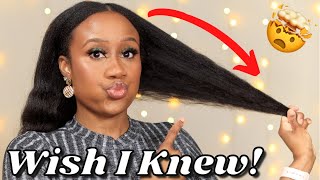What Science Says about Hair Growth and How Real Life Differs

Here’s a fun fact for you: a single bolt of lightning has enough energy to toast 100,000 slices of bread. Yet we continue to use fossil fuels as our main source of energy in the industrial and technological sector. Why, I hear you ask?
Without going into specifics, mainly it’s because fossil fuels are more dependable, we know where to find them and how to harness their energy to continue our industrial endeavours. The same cannot be said for lightning.
Here’s another one, more germs are transferred through shaking hands than kissing. True story. Yet you can bet your sweet behind that I will not be kissing my weird cousin Fred at our next family gathering. He will have to make do with my handshake.
Point is that science has a lot of answers to give us about aspects of our physical world and that includes our hair too. It can tell us how hair grows, it’s makeup in the molecular sense and even how it reacts in different environments. But not all scientific findings are easily transferable to real world situations. Here are few examples of situations in hair care where science clouds the issue when growth and length retention is the focus of your regimen.
Rates of hair growth
I’ve covered this topic in a previous post but to give you the cliff notes, we all hear over and over again that 6 inches of hair growth is what the average person should expect in any given year of hair growth. But the truth is actually more complicated than that.
Think about this, we accept that in hot summer months some of us will invariably get darker but to what degree? Some people get darker tans than others even exposed to the same amount of sunshine and others don’t tan very easily at all, they may just turn red.
In real life, rates of hair growth vary widely depending on genetics among groups of people, nutrition density of the diet or even environment. So the average rate of growth is mostly a suggestion, not a fact.
How long to deep condition your hair
Ever wonder why many bottles of conditioner say that you can rinse it out after two minutes? Well some cosmetic scientists and cosmetologists will tell you that conditioners don’t do much good to your hair after the first 2 minutes.
Others still say that a 1/2 hour is the maximum time that they should be left in your hair because absorption rates diminish after the first 30 minutes. Well that may be true in a lab environment with a handful of subjects but does the same hold true across the board for every single hair type, texture and porosity level there is out there? Errrm no.
We see this all the time, the women getting the best length retention are those deep conditioning* for a hour or so every week. Its not rocket science, if your hair is low porosity you need to deep condition longer but if your hair has medium to high porosity, you can get away with shorter deep conditioning* times.

Washing your hair daily
Daily washes lead to a healthier scalp and healthier hair right? Well maybe that’s true for some people but not all. When we as black women wash our hair, we also take on the monumental, sometimes frustrating challenge of styling it.
Now if your hair is naturally kinky* or curly then you will know all too intimately that wash day means as much as 5 hours out of your day from start to finish. Putting aside the immense time constraints of doing that every day, it would also mean that we would be manipulating our kinky* curly hair daily too and as you know the more manipulation the more chance for breakage. With that increased breakage we see increased incidents of split ends and single strand knots. Hardly the sign of healthy hair by anyone’s standards.
The simple fact is that many black women with super long hair average a wash every 2-4 weeks. It’s about finding the perfect balance of less manipulation with optimal care and making it work within your lifestyle.
Regular trims=Healthier hair
This is a myth that just won’t die down! Regular trims are definitely important in the grand scheme of things but it’s the regularity itself that I’m challenging. Wear and tear is a natural fact of any physical object including our hair BUT when you reduce the manipulation that you put on your hair drastically, you also reduce wear and tear which means less need for trims.
Think about it like this, if you buy yourself some pretty hair extensions* but due to lack of time or circumstances you do not wear them straight away. So they sit in their plastic wrap in your drawer for a few months before you finally head over to the stylist for your new hairdo. The last thing on your mind will be to trim those extensions* simply because a few months have gone by and a trim is due!
The same should apply to your own hair, a trimming schedule is not a one-size-fits-all situation, it should simply be a suggestion based on how often you handle your hair and your hair goals. All things being equal, in the instance that your hair is being manipulated less than average then a less than average trimming schedule would also apply.
Protein absorption rates
Science shows that the best absorption rate of protein in hair products are those with the lowest molecular size so egg protein is unlikely to help your hair unless processed to be smaller (as in hair products containing egg protein) rather than cracking a whole egg into a conditioner and slapping that your hair. But here’s the thing, women have been using plain ole eggs for eons with great results.
Where egg protein may fail to penetrate the innermost layers of your hair to correct damage, it does very well at correcting damage on the surface of your hair which could be more than enough to keep your hair healthy and happy.
You will find that it will be through the process of trial and error that you discover exactly which sources of protein will best suit your hair type.

Pore clogging oils
We all love a good oil and once you find your holy grail be it castor oil*, jojoba oil* or even just plain olive oil, once you find something that works for you it’s unlikely you will let anything as silly as science get in the way of that *wink*.
You may have seen the post published recently that showed products or ingredients that are pore clogging according to science. Surprisingly to many of us, it was found that coconut oil* is actually quite pore clogging. By comparison mineral oil* and petrolatum are not.
Same thing can be argued for cheap hydrogenated oils over natural hard fats like shea butter* or cocoa butter*. I don’t know about you but for obvious reasons you won’t see me giving up my coconut oil* for petrolatum laden products any time soon!
Have the tests been carried out on black hair?
Is this really relevant when the chemical make up all hair is the same? Actually yes, it doesn’t take a genius to figure out that black hair differs a lot from other hair types. It’s shaped differently microscopically, individual strands of hair both curl as well as twist their way out of our scalps, its more prone to breakage and holds less moisture on a good day than other hair types.
So when you see claims that a new miracle oil will make your hair 15 times stronger with several uses, really think about those claims before parting with your cash. A lot of the hair science conducted has been done on non black hair so while a product may work just as well on your curly mane as on someone with straight hair don’t expect exactly the same results. Take everything with a grain of salt but don’t knock things until you’ve tried them.
Conclusion
I could go on and on about things that work great in a lab environment but fail miserably in the real world but I’m sure you get my point now. I’m not trying to make you mistrust science, but rather to trust your gut when it comes to your own head of hair if you are experienced enough at handling it.
Science is a vital part of the hair industry as it will continue to be in the future. And even when it fails at giving us a clear solution to a problem it at least tells us where to look which can be invaluable anyway. Happy hair growing!




